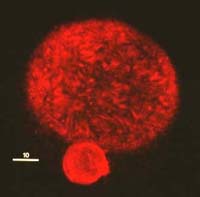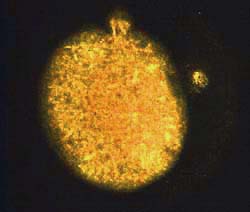
Photographer: ASU Research Magazine, Dr. Ian Gallicano

The walls in Professor Robert McGaughey's office are covered with photos of happy couples with babies and toddlers. They're not his relatives, but he did have a special role in their lives.
McGaughey (pronounced McGoy) is a researcher at Arizona State University who studies reproduction of mammals. He is a consultant at a hospital, where he is part of a team that implants fertilized eggs into the uterus of women who have not been able to conceive a baby by other methods.
He has a mini lab in the operating room. He takes the eggs the surgeons have removed from the patient and sorts through them to find "the best" -- the most mature and the most likely to take to fertilization. Then he cleans the eggs by removing layers of cells that coat them, mixes them with sperm from the patient's husband and takes the mixture to the surgical table. Then the doctors put the egg-and-sperm mixture back into the patient. The people in the photos in McGaughey's office are ones who had this operation.

When McGaughey was a kid, he had a microscope that he used to examine algae from pond water and other substances he found near his home. When he went to a small college in South Dakota and took a class in embryology, he looked at eggs of sea urchins, starfish and frogs under a microscope for the first time. "Once you have that experience, you get so intrigued," he said. "That egg will make a baby." Eggs give clues about what's going to happen. "You have to learn to communicate with them," McGaughey said. "They have their own way of telling you what they're up to."
For information on embryology go to The Virtual Embryo at the University of Calgary.
Read more about: He Knows a Good Egg When He Sees One
Bibliographic details:
- Article: He Knows a Good Egg When He Sees One
- Author(s): Gail Maiorana
- Publisher: temp
- Site name: ASU - Ask A Biologist
- Date published: 6 Nov, 2009
- Date accessed: 19 September, 2025
- Link: https://askabiologist.asu.edu/explore/he-knows-good-egg-when-he-sees-one
APA Style
Gail Maiorana. (Fri, 11/06/2009 - 16:21). He Knows a Good Egg When He Sees One. ASU - Ask A Biologist. Retrieved from https://askabiologist.asu.edu/explore/he-knows-good-egg-when-he-sees-one
Chicago Manual of Style
Gail Maiorana. "He Knows a Good Egg When He Sees One". ASU - Ask A Biologist. 06 Nov 2009. https://askabiologist.asu.edu/explore/he-knows-good-egg-when-he-sees-one
MLA 2017 Style
Gail Maiorana. "He Knows a Good Egg When He Sees One". ASU - Ask A Biologist. 06 Nov 2009. ASU - Ask A Biologist, Web. https://askabiologist.asu.edu/explore/he-knows-good-egg-when-he-sees-one

Eggs can be fertilized with a very tiny needle.
Be Part of
Ask A Biologist
By volunteering, or simply sending us feedback on the site. Scientists, teachers, writers, illustrators, and translators are all important to the program. If you are interested in helping with the website we have a Volunteers page to get the process started.


